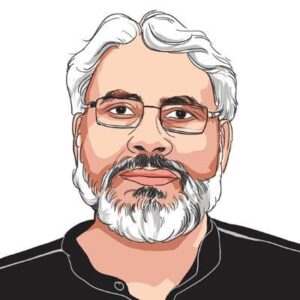 Prem Singh
Prem Singh
With Russia’s attack on Ukraine on 24 February 2022, the activities of the governments of various countries, all global institutions including the United Nations, embassies, media, subject experts etc. is firmly focused on the Russia-Ukraine war. After the Second World War, European leaders agreed that in the future, the soil of Europe would be kept free from wars. This happened to a large extent, except for the attacks of the Soviet Union carried out to suppress the ‘Prague Spring’ in Czechoslovakia in 1968 and the ‘Revolution’ in Hungary in 1956. It is now being said that due to the Russia-Ukraine war, Europe is again in danger of being in the grip of war. It is perhaps because of this that a country like Germany has also announced its intention to provide a huge number of weapons to Ukraine.
From day one in the Russia-Ukraine War, there have been reports of large-scale spontaneous civil resistance in many major cities of the world including Russia. But amidst the rapid developments surrounding the war, the voices of civilians opposing the war were muffled, and the war has already entered its eighth day carryinga killings and destructions on a large scale. There has been a long tradition of civil resistance against wars, especially in Europe and America. It is worth remembering that there was a long series of civil resistance in America in the 60s and 70s against America’s involvement in the Vietnam War. Similarly, the anti-nuclear civilian movement has a long tradition in America and Europe. A world-wide peace movement has existed parallel to the anti-war and anti-nuclear civilian movements. In these movements, some religious figures of the world have also been appealing for peace against wars and violence. But the civil resistance against wars and its associated violence and devastation has not worked earlier, nor can they be expected to work this time. Whatever solution will be found to the crisis arising out of the Russia-Ukraine war, it will come at the level of leaders of important countries and officials of global institutions. The civil society and its concerns will not play a role in that very solution.
Needless to say, an early or belated solution to the Russia-Ukraine war will be a temporary solution. Russian President Vladimir Putin, angered by economic sanctions and statements from the US, the European Union and NATO, has ordered Russia’s nuclear power to be on alert. Even if it is only Putin’s ‘rhetoric’, there are reports of Russia using cluster bombs and vacuum bombs in the war. This once again brings to the fore the reality that the use of nuclear weapons in the future cannot be ruled out. Even if the Russia-Ukraine war does not pose a threat to the whole of Europe at the moment, there are enough indications that the future of Europe is not free from such danger. The way the world arms industry/business is thriving; The ‘weapons of the future’ are being invented; Most countries are racing to buy the latest weapons; The number and dominance of dictatorial leaders riding on the wave of radical nationalism is increasing, despite the chances of the end of the Russia-Ukraine war, the depressing series of wars and civil wars in the world is not going to stop.
It is not without reason that despite large-scale civil resistance movements against wars and violence, the spread of wars and violence continues to increase uninterrupted. Dr Ram Manohar Lohia said in the 1950s that by the end of the twentieth century, between Gandhi and the atomic bomb, only one will win. Gandhi the symbol of non-violent civilization, and atomic bomb the symbol of violent civilization cannot co-exist. In fact, since the end of the second World War, the direction of the victory of violent civilization was decided as such. The idea of non-violent civilization proposed by Gandhi and many other world leaders and thinkers was never given a chance on the world stage. Therefore, the question is whether the civil society, opposed to wars and violence, really wants to give a chance to non-violent civilization in place of modern violent civilization? Does the civil society seriously consider the problem as a grave choice?
It cannot be said that the civil society is ignorant of the fact that modern industrial/post-industrial civilization operates on two strong wheels of arms and the market. The leadership of this civilization is elected to power because of the civil society, it is by the leadership chosen by the civil society that the representatives of the global institutions that run the world order are deputed. All wars from the colonial period to the present era have been for the possession of natural resources. The consumerist prosperity visible in Europe/America/Russia/Middle-East has been achieved by stealing the legitimate share of the world’s vast population. The islands of prosperity created in underdeveloped and developing countries are the result of dishonesty of the ruling classes living there. The new world order that was initiated in the joint supremacy of the US and the Soviet Union after the second World War, facilitated the rule of corporations, instead of citizens. In the world today, the political leadership of the world is subservient to these very corporations. Humane and sensitive subjects like language, education, art, culture have also come to be used and employed in the service of this violent civilization.
In fact, often the civil society appeals for anti-war and peace while sitting in the very lap of this violent civilization. The actors of civil society are not willing to give up the allure of violent civilization for the sake of the beginning and further expansion of a non-violent civilization. Therefore, in lieu of few awards and prizes, they are being easily co-opted into the system. The civil society, which has come out on the streets to oppose wars and violence, must first free itself from the captivity and the attractive lure of violent civilization. It has to give a clear message that not only Europe/America/Russia, but the whole world has to be freed from war. The leadership that would emerge from this message will be able to do the right contribution towards building a non-violent civilization. Civil society must realise that humanity does not need the tears of devastation caused by the war, but the radiance of peace.
(The writer associated with the socialist movement is a former teacher of Delhi University and a fellow of Indian Institute of Advanced Study, Shimla)




